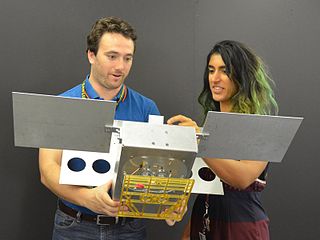Professional certification, trade certification, or professional designation, often called simply certification or qualification, is a designation earned by a person to assure qualification to perform a job or task. Not all certifications that use post-nominal letters are an acknowledgement of educational achievement, or an agency appointed to safeguard the public interest.
Software engineering is an engineering-based approach to software development. A software engineer is a person who applies the engineering design process to design, develop, maintain, test, and evaluate computer software. The term programmer is sometimes used as a synonym, but may also refer more to implementation rather than design and can also lack connotations of engineering education or skills.

Engineers, as practitioners of engineering, are professionals who invent, design, analyze, build and test machines, complex systems, structures, gadgets and materials to fulfill functional objectives and requirements while considering the limitations imposed by practicality, regulation, safety and cost. The word engineer is derived from the Latin words ingeniare and ingenium ("cleverness"). The foundational qualifications of an engineer typically include a four-year bachelor's degree in an engineering discipline, or in some jurisdictions, a master's degree in an engineering discipline plus four to six years of peer-reviewed professional practice and passage of engineering board examinations.
Regulation and licensure in engineering is established by various jurisdictions of the world to encourage life, public welfare, safety, well-being, then environment and other interests of the general public and to define the licensure process through which an engineer becomes licensed to practice engineering and to provide professional services and products to the public as a Professional Engineer.

An engineering technologist is a professional trained in certain aspects of development and implementation of a respective area of technology. An education in engineering technology concentrates more on application and less on theory than does an engineering education. Engineering technologists often assist engineers; but after years of experience, they can also become engineers. Like engineers, areas where engineering technologists can work include product design, fabrication, and testing. Engineering technologists sometimes rise to senior management positions in industry or become entrepreneurs.
A Bachelor of Engineering or a Bachelor of Science in Engineering or a Bachelor of Technology (BTech) is an undergraduate academic degree awarded to a student after three to five years of studying engineering at an accredited college or university.

Xiamen University, colloquially known as Xia Da, is a national public research university in Xiamen, Fujian, China.
An institute of technology is an institution of tertiary education that specializes in engineering, technology, applied science, and natural sciences.
Regulatory affairs (RA), also called government affairs, is a profession within regulated industries, such as pharmaceuticals, medical devices, cosmetics, agrochemicals, energy, banking, telecom etc. Regulatory affairs also has a very specific meaning within the healthcare industries.

Fire protection engineering is the application of science and engineering principles to protect people, property, and their environments from the harmful and destructive effects of fire and smoke. It encompasses engineering which focuses on fire detection, suppression and mitigation and fire safety engineering which focuses on human behavior and maintaining a tenable environment for evacuation from a fire. In the United States 'fire protection engineering' is often used to include 'fire safety engineering'.
CDIO are trademarked initiali for Conceive Design Implement Operate. The CDIO Initiative is an educational framework that stresses engineering fundamentals set in the context of conceiving, designing, implementing and operating real-world systems and products. Throughout the world, CDIO Initiative collaborators have adopted CDIO as the framework of their curricular planning and outcome-based assessment. The CDIO approach uses active learning tools, such as group projects and problem-based learning, to better equip engineering students with technical knowledge as well as communication and professional skills. Additionally, the CDIO Initiative provides resources for instructors of member universities to improve their teaching abilities.

Curtis Raymond Carlson was president and CEO of SRI International from 1998 to 2014 and is a prominent technologist and pioneer in developing and using innovation best practices. While CEO of SRI International, revenue tripled to $550 million per year and tens of billions of dollars of new marketplace value was created, such as through Siri, an SRI spin-off company that was bought by Steve Jobs at Apple. While Carlson was CEO Mayfield Ventures partner, David Ladd, said, “SRI is now the best enterprise at turning its technology into economic value.”

An engineering technician is a professional trained in skills and techniques related to a specific branch of technology, with a practical understanding of the relevant engineering concepts. Engineering technicians often assist in projects relating to research and development, or focus on post-development activities like implementation or operation.
Engineering education is the activity of teaching knowledge and principles to the professional practice of engineering. It includes an initial education, and any advanced education and specializations that follow. Engineering education is typically accompanied by additional postgraduate examinations and supervised training as the requirements for a professional engineering license. The length of education, and training to qualify as a basic professional engineer, is typically 5 years, with 15–20 years for an engineer who takes responsibility for major projects.

Kabul Polytechnic University is the main center of educating engineers in Kabul, Afghanistan. It was founded on 13 October 1963 as Kabul Polytechnic Institute and is located in 72 hectares of land in Karte Mamourin, North-Western Kabul. In the opening ceremony government officials from both Afghanistan and other countries were present. Since its establishment it has been considered one of the important entities in providing education and training.
Bakhtar University Bakhtar University (BU) is one of Afghanistan's oldest and most prestigious privately held universities. It was Established in 2005 from a small beginning at Kabul Polytechnic University; through its current location at Kart-e-Char. Bakhtar University is now recognized as an integral part of Afghanistan's growing economic, political and social circumstances. As an independent Afghanistan institution of higher education, BU, as the first established privately held institution, has been recognized with excellent and high-quality programs comparable to its international affiliates such as Indira Gandhi National Open University, India, American International College USA, Georgetown University USA, Attaturk University, Turkey, University of Putra Malaysia (UPM).BU has a commitment to the next generation of business, technology, political and cultural leaders in the modernization of Afghanistan. It is a pioneer in providing quality education in finance, accounting management, and introducing master's degree programs for the first time in Afghanistan and is a pioneer in providing a permanent mechanism for obtaining higher academic & professional qualifications in Afghanistan. During its short existence, the University has made a significant impact in higher education by reaching out to a large section of the population with a range of diverse and relevant programs that are of high quality and affordable. Since its inception, the University has attracted approximately over 5000 students in various disciplines and enjoy a quality academic experience BU offers a variety of specialist Undergraduate and Postgraduate in Business, Finance, Information Technology, Law, Journalism, and Engineering, which are directly linked to Afghanistan's human resource needs. All (BU) degree programs are accredited by the Ministry of Higher Education Afghanistan, International Accreditation Council for Business Education (IACBE) of the United States and are also audited by the QS Starts. The internationally recognized qualifications enable Bakhtar graduates to pursue rewarding careers in Afghanistan's burgeoning employment market. Because of the high-quality teaching program, BU students are currently placed in prominent positions in both the public and private sectors across the region. BU's Center for Language & Culture offers language courses in English. They range from English language study for University preparation. BU faculty is a mix of locally and internationally recruited academics with extensive teaching, business, and industry experience. They bring years of knowledge gained from research in their respective fields into the classroom, providing students with a stimulating academic environment.

Transilvania University of Brașov is a higher education and research institution in Brașov, Romania which comprises 18 faculties, with a number of over 19,500 students and over 730 teaching staff members. Currently, Transilvania University of Brașov is the largest university in the centre of the country, a university that offers programmes in fields such as: mechanical engineering, industrial engineering, computers, construction, forestry, wood engineering, product design, nutrition and tourism, computer science, mathematics, economics, medicine, pedagogy, music, literature and linguistics, law, sociology and social work, psychology. There are 100 undergraduate programmes in the University: 83 full-time study programmes, 6 part-time study programmes and 11 distance learning programmes, 74 master's degree study programmes and 18 doctoral fields.
An urban planner is a professional who practices in the field of town planning, urban planning or city planning.
Engineering education research is the field of inquiry that creates knowledge which aims to define, inform, and improve the education of engineers. It achieves this through research on topics such as: epistemology, policy, assessment, pedagogy, diversity, amongst others, as they pertain to engineering.

Ibrahim Sultan Polytechnic is a polytechnics in Pasir Gudang, Johor, Malaysia.








